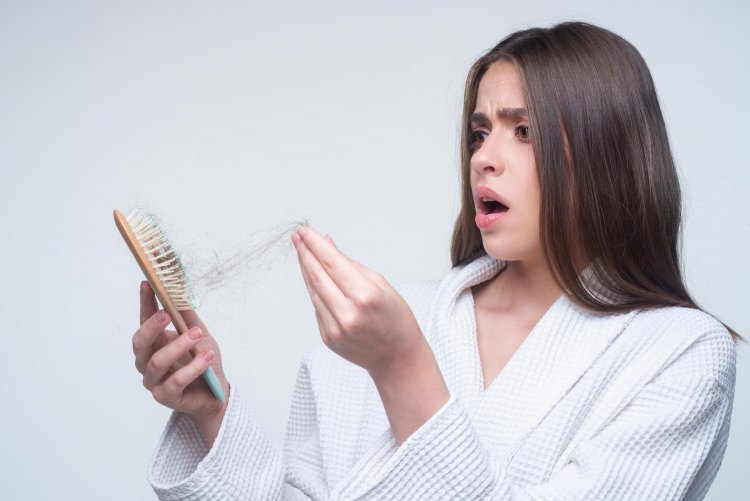Hair Loss: Causes and Treatments
Hair loss, also known as alopecia, is a common condition that can affect anyone regardless of age, gender, or ethnicity. It can be a significant source of distress, impacting self-esteem and emotional well-being. Understanding the various causes and exploring effective treatments is essential for those experiencing hair loss.

Causes of Hair Loss
Genetics
Androgenetic Alopecia: This is the most common type of hair loss, often referred to as male-pattern baldness or female-pattern baldness. It is hereditary and results from the shrinking of hair follicles influenced by dihydrotestosterone (DHT). Men typically experience a receding hairline and baldness at the crown, while women usually notice diffuse thinning over the crown.
Hormonal Changes
Pregnancy and Childbirth: Many women experience significant hormonal changes during pregnancy and after childbirth, leading to temporary hair loss known as telogen effluvium.
Menopause: The decrease in estrogen levels during menopause can cause hair to become thinner and more brittle.
Thyroid Disorders: Both hyperthyroidism (overactive thyroid) and hypothyroidism (underactive thyroid) can lead to hair loss due to hormonal imbalances.
Medical Conditions
Alopecia Areata: This is an autoimmune disorder where the immune system mistakenly attacks hair follicles, leading to round patches of hair loss on the scalp and other body parts.
Scalp Infections: Fungal infections such as ringworm can invade the hair and scalp, causing scaly patches and hair loss.
Chronic Illnesses: Diseases like lupus and diabetes can disrupt the normal hair growth cycle, leading to hair loss.
Medications
Medications for cancer (chemotherapy), arthritis, depression, heart conditions, and high blood pressure can cause hair loss as a side effect. This type of hair loss is usually reversible once the medication is discontinued.
Nutritional Deficiencies
Iron Deficiency: Iron is crucial for hair growth, and its deficiency can lead to hair thinning and loss.
Protein Deficiency: Hair is made of protein, and a lack of dietary protein can cause hair loss.
Vitamin Deficiencies: Vitamins such as Vitamin D, B12, and biotin are essential for healthy hair growth.
Physical or Emotional Stress
Telogen Effluvium: Significant physical or emotional stress can push large numbers of hair follicles into a resting phase, causing widespread hair shedding.
Trichotillomania: This psychological condition involves an irresistible urge to pull out one's hair, leading to noticeable hair loss.
Hair Care Practices
Styling and Treatments: Excessive use of hair styling tools (such as blow dryers, straighteners), chemical treatments (like perms and dyes), and tight hairstyles (like braids and ponytails) can damage hair follicles and lead to hair loss.
Treatments for Hair Loss
Medications
Minoxidil (Rogaine): An over-the-counter topical treatment available in liquid or foam form. It can be applied to the scalp to stimulate hair follicles and promote hair growth. It is effective for both men and women.
Finasteride (Propecia): A prescription oral medication for men that reduces hair loss by lowering DHT levels. It is not recommended for women of childbearing age due to potential risks to a male fetus.
Hair Transplant Surgery
Follicular Unit Transplantation (FUT): Involves removing a strip of scalp from a donor area (usually the back of the head) and transplanting follicular units into balding areas. This method leaves a linear scar but allows for a larger number of grafts to be transplanted.
Follicular Unit Extraction (FUE): Individual hair follicles are extracted directly from the donor area and implanted into thinning or balding areas. FUE leaves minimal scarring and has a quicker recovery time compared to FUT.
Laser Therapy
Low-Level Laser Therapy (LLLT): Uses red light to stimulate hair growth by increasing blood flow to hair follicles and enhancing cellular activity. It is a non-invasive treatment suitable for both men and women.
Platelet-Rich Plasma (PRP) Therapy
PRP involves drawing a patient’s blood, processing it to concentrate the platelets, and injecting the plasma into the scalp. The growth factors in PRP can stimulate hair follicles and promote new hair growth. It is often used in conjunction with other treatments.
Lifestyle and Home Remedies
Balanced Diet: Consuming a diet rich in vitamins, minerals, and proteins supports overall hair health. Foods like leafy greens, nuts, seeds, fish, and lean meats can help maintain healthy hair.
Gentle Hair Care: Using mild shampoos and conditioners, avoiding excessive heat styling, and minimizing chemical treatments can prevent hair damage and loss.
Stress Management: Techniques such as yoga, meditation, and regular exercise can help manage stress, which in turn can reduce hair loss.
Alternative Treatments
Natural Remedies: Some people use essential oils (like rosemary, peppermint, and lavender) and herbal supplements (such as saw palmetto and ginseng) to promote hair growth. While some studies suggest benefits, more research is needed to confirm their efficacy.
Acupuncture: This traditional Chinese medicine practice involves inserting thin needles into specific points on the body. Some believe it can improve blood flow to the scalp and promote hair growth, although scientific evidence is limited.
Hair loss is a complex condition with various underlying causes. By identifying the specific cause, individuals can choose the most appropriate treatment to manage and potentially reverse their hair loss. While some treatments offer significant improvements, others may provide only temporary relief. Consulting with a healthcare professional or a dermatologist is crucial for receiving a proper diagnosis and developing an effective treatment plan tailored to individual needs.
Disclaimer
The information provided in this article is for educational purposes only and should not be considered medical advice. If you have any health concerns or are experiencing symptoms, it is important to consult with a healthcare professional, such as a doctor or clinic, for proper diagnosis and treatment. Always seek the advice of your doctor or other qualified health provider with any questions you may have regarding a medical condition. Do not disregard professional medical advice or delay in seeking it because of something you have read in this article.
#HairLoss #HairCare #HairLossTreatment #HealthyHair #HairGrowth #StressManagement #HairTransplant #LLLT #Minoxidil #Finasteride #PRPTherapy #NaturalRemedies #Acupuncture
What's Your Reaction?





















